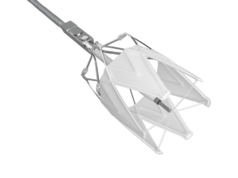
Four-factor prothrombin complex concentrate (4F-PCC)—a shelf-stable medication containing freeze-dried clotting factors—has been shown to be significantly more effective in addressing severe bleeding during cardiac surgery compared to the current standard of care, frozen plasma.
This is the headline finding from FARES-II, a phase 3, randomised, active-control study, comparing the two approaches in adult cardiac surgery patients who developed excessive bleeding. Findings of the trial were presented by Keyvan Karkouti (University of Toronto, Toronto, Canada), the study’s principal investigator, during a late-breaking trial session at the 2025 American College of Cardiology (ACC) scientific session (29–31 March, Chicago, USA), and published simultaneously in the Journal of the American Medical Association (JAMA).
Around 15% of patients experience excessive bleeding during cardiac surgery, Karkouti detailed in his presentation, with frozen plasma transfusion a current standard therapy. Preliminary data have suggested that 4F-PCC—purified, concentrated, and pathogen-reduced derivatives of plasma that do not require thawing or ABO blood type matching—may be a suitable alternative to frozen plasma.
FARES-II, which was carried out at 12 hospitals in Canada and the USA, included 420 patients with excessive bleeding during cardiac surgery involving the use of a heart-lung bypass machine. Patients had a median age of 66 years, 65% were white, and 74% were men.
The study’s primary endpoint was the absence of any need for additional intervention to stop bleeding in the period between one hour and 24 hours after initiation of the first treatment dose. Secondary endpoints included severe to massive bleeding, the amount of blood products transfused and serious adverse events, including blood clots or death within 30 days after surgery.
At 30 days, patients treated with 4F-PCC were 44% less likely than those treated with frozen plasma to need additional intervention to stop bleeding and 49% less likely to experience severe or massive bleeding during the one- to 24-hour period after initiation of the first treatment dose. Compared with patients treated with frozen plasma, those treated with 4F-PCC needed 29% fewer blood transfusions.
Overall, the number of adverse events was similar in the two groups; however, patients treated with prothrombin complex concentrate were 25% less likely than those treated with frozen plasma to experience a serious adverse event and 45% less likely to experience acute kidney injury. Blood clots occurred in 8.5% of prothrombin complex concentrate-treated patients and in 7.2% of those treated with frozen plasma, a non-statistically significant difference. Seven patients in the prothrombin group and eight in the frozen plasma group died.
These findings should prompt reconsideration of existing guidelines for the management of excessive bleeding in patients undergoing complex cardiac procedures such as heart bypass, heart valve replacement or aortic surgeries, Karkouti said.
“Patients randomly assigned to treatment with 4F-PCC needed significantly fewer interventions to stop their bleeding, lost less blood, received fewer blood transfusions and had fewer surgical complications than those who were randomly assigned to be treated with frozen plasma,” Karkouti commented. “The results suggest that using 4F-PCC to manage excessive bleeding during cardiac surgery potentially has substantial benefits for patients and the healthcare system by relieving pressure on the blood supply and other hospital resources.”
Kenichi Tanaka (University of Oklahoma College of Medicine, Oklahoma City, USA), a co-author of the clinical trial, said that the use of 4F-PCC instead of frozen plasma, whilst being beneficial for patients, could also improve resource usage in the intensive care unit (ICU).
“4F-PCC is 25 times more concentrated than frozen plasma, so we can stop the bleeding more efficiently,” Tanaka said. “It’s like drinking espresso versus regular coffee in the morning—because espresso is highly caffeinated, you don’t have to drink as much to achieve the same caffeine level.
“I think it will also improve resource utilisation. 4F-PCC can be given to patients with any blood type; we won’t need to keep as many blood-type specific frozen plasmas for heart surgery patients. With better bleeding control, we may consume less resources in the ICU.”
The study was funded by Octapharma AG of Switzerland, which manufactures the 4F-PCC used in the study, and by the Canadian Institutes of Health Research (CIHR). Octapharma AG was also involved in the final design and conduct of the study, as well as in data interpretation and review of the manuscript submitted for publication.










